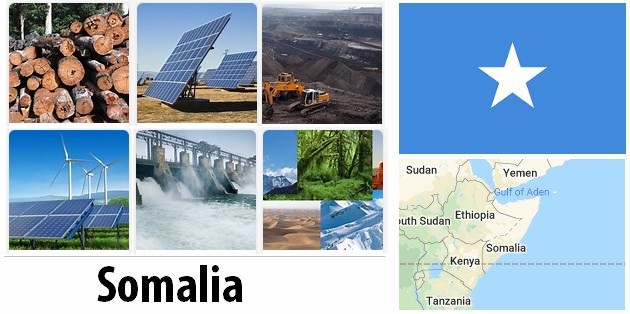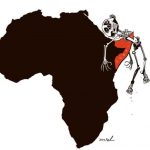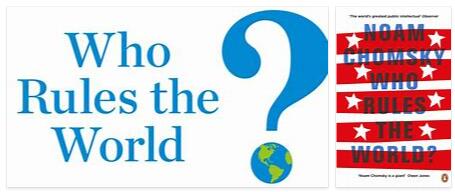Natural resources and energy
Somalia’s mineral resources are not very well explored, but it is known that there are at least plaster and small amounts of gold, silver, tungsten, manganese, limestone, iron, chromium, nickel, bauxite, copper and uranium.
Oil and gas are believed to be both onshore and offshore (especially in the northern part of the country). However, several companies have started searching for oil in Somaliland and Puntland. Some oil and natural gas discoveries have been made, but no recovery has been initiated.
- COUNTRYAAH: Major exports by Somalia with a full list of the top products exported by the country. Includes trade value in U.S. dollars and the percentage for each product category.
Most of the electricity produced in Somalia comes from privately owned diesel-powered generators. Instead, most Somalis refer to firewood and charcoal for their energy supply, which has led to problems with deforestation. It is also exacerbated by the fact that charcoal from acacia trees is exported to Kenya. Overwork is also a problem.
- Abbreviationfinder: A popular acronym site in the world covering abbreviation for each country. For example, SO stands for Somalia. Visit itypeusa for more information about Somalia.
FACTS – ENERGY AND ENVIRONMENT
Carbon dioxide emissions in total
609,000 tonnes (2014)
Carbon dioxide emissions per inhabitant
0.0 tonnes (2014)
The share of energy from renewable sources
94.3 percent (2015)
2019
December
The United States kills “four terrorists” in aviation
December 29
US military claims to have killed “four terrorists” from al-Shabaab in three targeted air strikes. The raids occur in response to the attack in Mogadishu the day before.
At least 79 dead in Mogadishu attacks
December 27
At least 79 people are killed in a car bomb attack in the morning rush hour in Mogadishu. At least 16 of the victims are university students, but 17 police officers and two Turkish engineers are also killed. Furthermore, according to unconfirmed reports, more than 100 people have been seriously injured. Turkey later sends a plan to evacuate at least 15 seriously injured Somalis for care. Turkey also sends 24 doctors and other healthcare professionals to help them on site. No group has assumed responsibility for the act, but the suspicions are directed at the militant Islamist group al-Shabaab.
Floods and grasshopper swarms hit Somalia
December 19
Somalia has suffered from an invasion of grasshoppers, which has hit hard on crops and pastures. It has hit a country where there is already a food shortage, and which earlier in the year has been hit hard by both drought and severe rainfall, with subsequent floods that left around 180,000 people homeless. According to the FAO, a grasshopper swarm, on average, destroys foods that could be enough to feed 2,500 people over a full year.
Five dead in attack against military base
December 12
Four civilians and one soldier are killed when dozens of members of the militant Islamist group al-Shabaab attack a military base, Hilweyne, just over two miles from Mogadishu. For a period, the assailants take control of the base before retreating. Among the victims are two women who usually sell food and other supplies to the base.
Several dead in attacks on hotels in Mogadishu
December 10
At least three civilians and two soldiers are killed when the militant Islamist group al-Shabaab attacks an hotel in Mogadishu, close to the presidential palace. Two of the assailants are killed outside the hotel, while another three get into it. 82 people were evacuated before Somali security forces took full control of the hotel and all the assailants were killed.
November
Somalia and Kenya agree to normalize relations
November 15
Somalia and Kenya have agreed to normalize contacts after a lengthy dispute over sea rights in an area believed to be rich in oil and gas. At the beginning of the year, the conflict led Kenya to call its ambassador for consultations and invited Somalia’s embassy to leave Kenya (see February 2019). After Ethiopian mediation, diplomatic relations were resumed in March, but only now is it possible again to obtain a travel visa to the neighboring country directly at the border. The country’s presidents, Mohamed Abdullahi Mohamed and Uhuru Kenyatta, promise at a meeting to try to find ways to strengthen diplomatic and bilateral relations. The dispute over sea rights is already handled by the International Court of Justice (ICJ)) in The Hague. In October, following a request from Kenya, CJ agreed to postpone the process for one year.
At least ten dead in severe floods
November 1st
At least ten people are killed in severe flooding in the city of Beledweyne in the middle of Somalia. About 270,000 people have also been forced to leave their homes to escape the masses of water. Concerns are high that continued downpours with subsequent floods will lead to disease spreading and even more people being forced to leave their homes.
October
Amnesty criticizes US drone attacks
October 1st
Amnesty again criticizes US for killing civilians in US drone attacks (see March 2019). This concerns a scare on March 18, 2019, in which three peasants who lacked ties to al-Shabaab were killed. The United States then claimed that three members of al-Shabaab were killed. In the spring of 2019, the US military command Africom promised to investigate Amnesty’s information, but it has not. Nor have any attempts been made to contact the male relatives. From 2017, but especially this year, the number of drone attacks has increased significantly. 2019 is also the year in which most people have been killed in al-Shabaab terrorist attack, about 1 200. Read more about it here (article in English from the BBC).
September
Islamists carry out attacks on US special forces
The militant Islamist group al-Shabaab targets a suicide attack on a base where US special forces train Somali military. Outside the base located at Baledogle Military Airport, in the Lower Shabelle region, about 10 miles west of Mogadishu, two car bombs are detonated. This is followed by an attack in which an unknown number of armed militiamen attack the base. According to al-Shabaab faithful media, 121 American soldiers are killed, which is denied by the United States, which in turn says that ten milers were killed and that one of al-Shabaab’s vehicles was destroyed by air raids. On the same day, another car bomb attack is directed against a column of Italian advisers in Mogadishu. However, nothing is damaged.
Ready for new anti-corruption commissions
September 21
President Mohamed Abdullahi Mohamed signs a new anti-corruption law. It means, among other things, that independent anti-corruption commissions should be formed at both national and regional levels. The measure is being taken to improve the country’s image. In 2018, Somalia was in last place in Transparency International’s index of perceived corruption in the countries of the world. But it is also about persuading the IMF and the World Bank to try to write off Somalia’s debts.
Amisom soldiers are killed in ambush
September 14
An unknown number of Amisom forces are killed in ambush against a military column en route from Jowhar to Mogadishu. The death toll differs between different sources, one source states that 12 Burundian soldiers have been killed, while the militant group al-Shabaab, which has taken on the killing, claims that 14 soldiers have been killed. Just hours before the attack, three people had been killed in an attack on the same road.
August
Presidential elections in Jubaland block contradictions to Mogadishu
22 August
Ahmed Mohamed Madobe is re-elected as President of Jubaland (sometimes spelled Jubbaland). Madobe, who belongs to the evil of the next largest clan in the area, gets 56 of the 74 votes cast in the state parliament. Several opposition candidates who have been barred from participating hold their own vote, which is won by Abdirashid Mohamed Hidig, a member of the federal parliament. The election has diluted the ongoing power struggle between the government in Jubaland and the holders of Mogadishu who refuse to approve the election. It has also led to tensions between Kenya, which supports Madobe and Ethiopia, which have close ties to the Somali government.
New security managers are appointed
22 August
President Mohamed Abdullahi Mohamed re-furnishes within the security apparatus and appoints new heads of the national intelligence service, the police and the army. At the same time, Omar Mohamud Mohamed, who has lived in the UK for many years, is appointed new mayor of Mogadishu. He replaces Abdirahman Omar Osman who was killed in an attack in July.
July
Army reform is initiated
July 26
Steps are being taken to reform the Somali army. A first step, which was taken in March, is for the authorities to start paying salaries directly to the soldiers’ salary account, in order to avoid money disappearing on the road. This is done via a biometric system where, among other things, fingerprints are used to identify the account holder. About 10,000 names of soldiers who do not exist or those who have deserted have been deleted from payrolls. Not everyone welcomed the action, in March a number of soldiers deserted in protest. They are under pressure from aid donors who also want the Somali army to eventually take over responsibility for security in the country from the Amisom peacekeeping force. However, according to most analysts, it will take some time before they have the capacity to do so.
At least 17 dead in bombing
July 22nd
At least 17 people were killed in a car bomb attack in Mogadishu, near the international airport. Among the victims are the mayor of the capital, Abdirahman Omar Osman. The militant Islamist group al-Shabaab takes on the deed.
At least 26 dead in Kismayo attacks
July 12
At least 26 people are killed in an attack on a hotel in the port city of Kismayo, where elders and politicians from the region gathered to discuss the upcoming state elections in Jubaland. The deed begins with a suicide attack outside the hotel, which is then attacked by three armed men. One of the victims is a candidate who would have stood in the regional presidential election. Among the dead, there are also two journalists and an employee of the United Nations Migration IOM. The militant Islamist group al-Shabaab takes on the deed.
Three al-Shabaab members are executed for bombing
July 10
Somalia executes three members of militant Islamist group al-Shabaab for their involvement in a bomb attack against a hotel in Mogadishu 2017, in which 18 people were killed and 47 people injured.
Somalia breaks contacts with Guinea
July 5
Somalia breaks diplomatic relations with Guinea since a Somaliland delegation visited the West African country under the leadership of President Muse Bihi Abdi. Somaliland proclaimed itself an independent state in 1991 but has not been recognized by any other country. When visiting Guinea, according to information from the AFP news agency, the Somali delegation should have discussed plans to establish diplomatic relations.
June
At least 16 dead in Islamist deeds
June 15
Somalia is shaken by several attacks. In Mogadishu, at least eight civilians are killed and 16 injured when a car bomb explodes near Parliament. The security service states that another car bomb attack was stopped in the Somali capital by shooting the person driving the car. In southern Somalia, near the border with Kenya, another act is targeted at a transport of eleven Kenyan police officers. At least eight of them must have been killed when a road bomb exploded, according to local sources. The Islamist group al-Shabaab has taken on all the deeds.
More than two million Somalis are threatened by starvation
June 5
The UN warns again of severe famine in Somalia after the worst drought in the country in 35 years. The UN has promised disaster relief of $ 45 million for water, food and other humanitarian aid to Somalia, but also other drought-stricken areas in northern Kenya and parts of Ethiopia. Most of the money will go to Somalia, where the UN estimates that over two million people will be in acute famine in September, an increase of 40 percent since the beginning of the year. An additional three million Somalis are expected to have insufficient food. The rainfall that fell during the rainy season in April and June has been insufficient. In addition, less rain than usual came in the fall of 2018.
May
The UN reduces Amisom’s troop strength
May 31st
The UN Security Council has decided to reduce the regional peacekeeping force Amisom by 1,000 men, despite an increase in the number of attacks in Mogadishu. But an opening is left for the decision to be re-examined if the violence increases further. In February 2019, when Amisom’s mandate was extended for another year, the force consisted of just over 19,000 men.
US ex-diplomat takes over as UN envoy
30 May
An American former diplomat, James Swan, takes over the post of UN Special Envoy in Somalia. He replaces Nicholas Haysom who was forced to leave his post in January after the Somali government accused him of interfering with the country’s internal affairs (see January 2019).
Drought causes famine in Somalia
May 6
Severe drought has resulted in almost two million Somalis in urgent need of food assistance, according to the Norwegian Refugee Council. Hundreds of thousands of children are already suffering from malnutrition and many people have left their homes in the countryside to search for food. Similar figures also come from the UN, which fears that the number of vulnerable people will increase by half a million until July.
April
The United States admits that civilian Somalis have been killed in trachea
April 5
The United States is admitting for the first time that two civilian Somalis have been killed in connection with US airstrikes. This applies to a scare in the El Burr region in April 2018. Amnesty has claimed that the number of civilian deaths is higher than that (see March 2019). Until now, the US military has insisted that no civilian casualties have been required at all.
March
At least 15 dead in terrorist attacks
March 23rd
The militant Islamist group al-Shabaab is launching an attack on a government building in Mogadishu. At least 15 people are killed, including Deputy Labor Minister Saqar Ibrahim Abdala and several policemen. Five of the assailants are killed in connection with the attack.
Amnesty: US Air Force demands civilian sacrifices
March 19
In recent years, the United States has increased its air strikes against militant Islamist groups in Somalia. According to Amnesty, over 100 raids have been conducted since June 2017, which is significantly more than in Yemen and Libya. It is about missiles that are fired from manned aircraft and with the help of drones. According to the US military, 800 people have been killed in the attacks, but all reports state that no civilian casualties have been claimed. Amnesty disputes this and has concluded that 14 civilians were killed in five attacks that were investigated in more detail, four of which were performed by the United States. The report The Hidden US War in Somalia is based, among other things, on interviews with 150 people, satellite images and photographs.
At least 20 dead in attacks in central Mogadishu
March 1st
At least 20 people are killed and a hundred injured in an attack in central Mogadishu. A member of al-Shabaab carries out a suicide attack outside a hotel, after which the militant Islamist group occupies a nearby restaurant, which is later surrounded by Somali government forces. During the day, gunfire is ongoing in the area, before the siege is said to be over and four assailants must have been killed. al-Shabaab is said to have used civilians as human shields. According to media, the death toll is expected to rise. On the same day, the United States launches yet another airstrike against al-Shabaab and claims to have killed 26 Islamists in the Hiran area.
February
Border disputes create tension between Somalia and Kenya
February 16th
A border dispute between Somalia and Kenya over a sea area equivalent to 100,000 square kilometers which is believed to be rich in oil and gas creates tensions between the countries. This has happened since Kenya accused Somalia of having auctioned oil and gas rights in the disputed area in early February. The Somali government claims the allegations are wrong, but Kenya calls its ambassador from Mogadishu for “consultations” and calls on Somalia’s ambassador to leave the country. In 2014, Somalia turned to the International Court of Justice (ICJ)) in The Hague in the Netherlands to settle the matter, after talks about the border collapsed. The dispute is causing a number of Khat traders in Somalia to stop buying the drug from Kenya. According to the BBC, Somalia imports around 50 tonnes of khat a day. After Ethiopian mediation, diplomatic relations resume in March of the same year.
Ten people are killed in new assaults
February 4th
Nine people are killed in a car bomb attack against Hamarweyne market in Mogadishu. Earlier in the day, the Maltese head of the port of Bossasso was shot dead. The militant militia al-Shabaab takes on both deaths.
January
Over 50 dead in American aviation
January 19
The United States claims to have killed 52 members of al-Shabaab in yet another airstrike. According to the US military command Africom, this occurs in connection with the Islamist group attacking a military base in Bulogagdud with heavy weapons and explosives. According to sources in nearby villages, al-Shabaab raids the facility and steals a military vehicle. Six soldiers are said to have been killed during the attack, while two were killed in mine explosions after the military recaptured the base.
Dozens are killed in American aviation
January 9
The United States has conducted several airstrikes in Somalia on January 6 to 8, killing 16 jihadists, according to the US military command Africom. Another airplane, in which ten al-Shabaab members were killed, was to be carried out on January 2.
Said Abdullahi Deni new president of Puntland
January 8
Parliament in the Puntland region appoints businessman Said Abdullahi Deni as new president for a five-year term. The election is held in three rounds and Deni has 20 contenders from the beginning, including incumbent President Abdiweli Mohamed Ali Gaas. All defeated candidates congratulate Deni for the victory. The 66 members of Puntland’s parliament, including a woman, are appointed by clan elders.
The UN Security Council agrees to appoint a new envoy
January 6
The UN Security Council regrets the decision by the Somali government to expel UN envoy Nicholas Haysom, but still agrees to appoint his replacement. At the same time, the Security Council emphasizes that it expects cooperation between the UN and Somalia to work. UN Secretary-General António Guterres has called Somalia’s president on two occasions to persuade him to let Haysom stay in office.
UN envoy is ordered to leave Somalia
January 2
Somalia orders UN envoy Nicholas Haysom to leave the country and forbids him to work in the country. The government accuses him of interfering with the country’s internal affairs. This happens after Haysom, in a letter to the Minister of Security, asked questions about why UN-backed security forces participated in the arrest of the defeated Islamist leader Mukthar Robow (also called Abu Mansur) ahead of the elections in the south-west state in December (see December 2018). The arrest led to clashes between Somali forces and Robow’s supporters. Ethiopian forces, which formally belong to Amisom, were also involved. According to the government, Robow was intervened because of suspicions that he had brought in weapons and militia in Baidoa. At least 15 civilians were killed in connection with protests against his arrest and 300 people, many of them children, were taken into custody. In his letter, Haysom wonders if the authorities have taken any action to investigate what has happened to them. A cover letter also states that the EU, Germany and the United Kingdom are suspending their support to the police forces in the southwestern state because of how they acted in the election. A few days later, Somalia’s UN ambassador urges the UN Security Council not to intervene in the country’s national affairs.










